Profitable Farmer
This show is all about increasing the profitability of your farm so you work smarter and not harder. Your host, Jeremy Hutchings (Managing Director at Farm Owners Academy), reveals the best farming business tips for more leverage in your farm business.
This show is all about increasing the profitability of your farm so you work smarter and not harder. Your host, Jeremy Hutchings (Managing Director at Farm Owners Academy), reveals the best farming business tips for more leverage in your farm business.
Episodes

Saturday Feb 29, 2020
# 45 - Making Farm Succession Work
Saturday Feb 29, 2020
Saturday Feb 29, 2020
Succession is a misunderstood and very challenging issue for many Australian farming families. Many of us have tried this and had a negative experience and therefore choose to lock it down, not discuss inter-generational transfer at all and get on with running the farm... rather than constructively planning for the future together.
In this podcast, we interview Managing Director of Catapult Wealth, Tony Catt. Tony is an expert on farm succession and is passionate about helping farming families proactively develop a plan for their futures together.
Tune in as we explore:
Why this is so challenging for so many,
What farm succession really is,
Through good business practice and 'governance' we can make succession more successful for families,
The 4 clear, written plans we really need to make this truly effective in practice,
Why the younger generation might need to be respectful and patient in the process,
How to include family members and bring them along for the ride,
How frequently to be discussing this and refining your plan, AND
How to get started.
At Farm Owners Academy, we recommend Tony and Catapult Wealth…we believe that proactive business planning can complement and form the basis for stronger succession planning and more meaningful intergenerational transitions for all.
Enjoy this interview... ideally over a cup of tea, and as a family. We hope this enables you to reflect on where you are at on this journey, agree how to move forward together, and also, who you need around you to give yourselves every chance of success.
The key is to come together and get started!
I look forward to hearing your family’s success stories in all thing’s succession.
Kind Regards,
Jeremy

Friday Feb 14, 2020
# 44 - How the fear of failure can destroy your dreams
Friday Feb 14, 2020
Friday Feb 14, 2020
Implementation is the key to success!
In today’s podcast, I chat with Andrew and discuss the importance of realising, accepting and overcoming your fears in order reach your potential in all areas of your life. We explore the concept of fear and how this holds us back, especially the fear of failure in business.
Join us as we dive deeper into:
How perfectionism can hold you back - most people tend to procrastinate because of this, as they worry about making the wrong decision
How you can set up systems to help you make concise decisions, this requires thinking, which most people don’t like to do – most farmers prefer to DO rather than THINK!
Implementation is the key to success, not the decision making however this is still a very critical part.
Never allow a year, a quarter, a week or a day go by without planning it first - this is the KEY to succeeding - yet most people don’t do this.
Stop using excuses to set your goals later - do it NOW!
The power of 10-year, 3-year and 12-month goals, quarterly rocks, weekly & daily goals – If you make time to write these down, you will become unstoppable.
How taking control of your business and developing systems will help you make more profit and allow your team to become more focused and efficient.
If you don’t set goals, your team is winging it which will cost you lots of money, for little return.
Your greatest life is on the other side of fear! We hope you enjoy this podcast and identify the fears which might be holding you back.
To find out more about our Take Control Program, please click here... take advantage now before the price increase! Enjoy,
Jeremy

Friday Jan 31, 2020
# 43 - From Refugee to Riches
Friday Jan 31, 2020
Friday Jan 31, 2020
Time to diversify...
Creating balance sheet wealth long-term must be our primary focus, even when challenged in the here-and-now. Success in anything starts with KNOWLEDGE. It is with this in mind that I interview Terry Tran, CEO & Founder of The Freedom Trader.
Terry Tran is a good (and perhaps unlikely) friend to Farm Owners Academy and the Profitable Farmer podcast. We recommend his investing program - The Freedom Trader - and know many of our clients continue to get great training and real results from his mentoring and methodology.
In this podcast, Terry shares his story with us, his passion to help people create wealth through direct share investing, his investment philosophy and his view on why farming families make such good investors. We uncover some very real myths about the share market and explore how to create wealth through a strong analysis and risk-aware investment strategy.
I encourage each of you to listen to this and consider, even in times of dry seasons and tight cashflows, whether now is a good time to be learning HOW to strengthen your wealth creation capacity through robust and measured share investing.
If you’d like to see for yourself what Terry’s ‘Freedom Trader’ program is all about, he is hosting a live training on Tuesday 18th February and its completely FREE for all our podcast listeners! You can register by clicking here: How to Create Real Wealth Outside Your Farm SAFELY but do it now as space is limited!
Enjoy!
Jeremy Hutchings

Wednesday Jan 15, 2020
# 42 - Responding strongly in times of real adversity
Wednesday Jan 15, 2020
Wednesday Jan 15, 2020
2020 has arrived to us in a way that no one wished for or expected. Adverse and extreme fires threaten farming families and rural communities across Australia.
To those of you directly affected, our thoughts and prayers are with you. To our clients, please know you have our support and that of the FOA Community.
In this important podcast we interview remarkable clients Troy & Nette Fischer, 'Ashmore', Wasleys, South Australia.
On the 25th November 2015, Troy & Nette lost everything except their family home and 600 trade lambs in the Pinery fires of South Australia. Their entire farm, including their white suffolk stud and all farm infrastructure burned completely.
Their story and recovery effort is remarkable. How they have responded and the results they have achieved in the 12 months, 2 years and now 4 years since that event is nothing short of incredible.
Hindsight can be a wonderful thing. As they reflect on their personal experience, Troy and Nette share some wonderful tips and very thoughtful insights on how to navigate these intensely tough times, as well as how to best support those directly affected.
To those of you who are affected directly at this time, I hope by sharing Troy & Nette's story, they can serve as inspiration and encouragement to you. We hope this interview can help you in some small way to navigate the hardship you feel and the road to recovery ahead.
To those exploring how best to support loved ones, friends and family directly affected - now and ongoing - Troy and Nette share some very real and meaningful actions you can take that can truly make a difference and add value to those in need.
Thank you Troy & Nette - I am grateful for your willingness to help others by sharing your story.
This is the time when communities rally and remarkable growth and recovery can happen... as it did for the Fischer Family.
Regards, Jeremy

Monday Dec 30, 2019
# 41 - It’s time to reflect, it’s time to reset and renew
Monday Dec 30, 2019
Monday Dec 30, 2019
Tracy Secombe is incredible. Plain and simple.
Her support to her Farm Owners Academy clients once again this year has been astounding.
Her contribution to our community continues to inspire.
Our clients just get so much value from her outlook on life and the coaching she can provide.
As we bring a close to 2019, it is my great pleasure to connect with and interview Tracy, and to explore how to make this Christmas season an important moment in time to deeply reflect, clearly check-in, fully self-assess, and completely set down more powerful intentions and enriching habits in the new year to come.
A cracking conversation. An amazing lady.
Enough said...enjoy!
Jeremy Hutchings
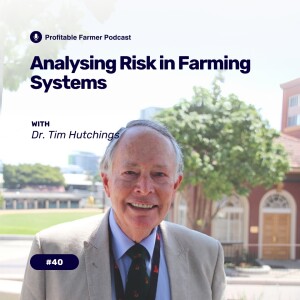
Monday Dec 16, 2019
# 40 - Analysing Risk in Farming Systems
Monday Dec 16, 2019
Monday Dec 16, 2019
How exposed am I? Assessing and managing risk within our farming systems.
I love the principle that in order to succeed, it is the business with the most robust and strategic business model that gets the results. Often it is the quality of our business model and how we execute on this model that is the difference between the average and the top 20%.
With this in mind, and based on your most recent years of performance, how robust and risk-aware is your business model? We operate in a unique climate, with unique economic factors, relative to farmers in other countries, and a high exposure to price variability and international markets. We operate businesses based on biological systems often exposed to the vagaries of our environments and the markets.
In this podcast, I am pleased to interview my father, Tim Hutchings, and discuss risk and volatility in Australian Agriculture. We explore the importance of designing risk-aware and long-term sustainable farming systems that have inherent flexibility, focused on minimising losses as much as pursuing windfall profits.
Dr. Tim Hutchings is a successful farmer and farm consultant in the Riverina, NSW. He is a Nuffield Scholar and Researcher and has recently completed his PhD analysing and (for the first time) quantifying risk and volatility of our farming systems.
As we dust ourselves off from the challenges of a dry season, reflect and reset for a new season, I encourage you to use this podcast as your opportunity to deeply interrogate the appropriateness of your current farming system, and as a catalyst to ask better questions and consider making some deliberate and measured changes.
Enjoy this podcast!
Regards,
Jeremy Hutchings
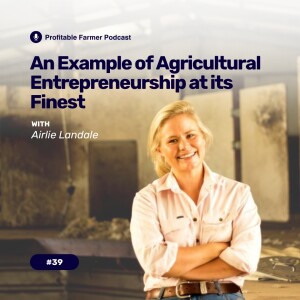
Saturday Nov 30, 2019
# 39 - An example of agricultural entrepreneurship at its finest
Saturday Nov 30, 2019
Saturday Nov 30, 2019
From a desire to find useful farm research and analysis tools for her own family... to Australia's number 1 online resource hub for farmers and agribusiness!
Farm Table’s story is a compelling reminder how we all can find a problem and seek to solve it in order to make our industry stronger and better for everyone.
Ladies & gentlemen, meet Airlie Landale - Founder and CEO of Farm Table.
Airlie is an incredible next generation champion for Australian Agriculture, doing her bit to make a very real and tangible difference for farming families nationally. From a small idea, Airlie has dedicated herself to solving a problem for the betterment of all farmers.
In this podcast we interview Airlie, understand her background, learn about the Farm Table story, and get a real insight into what can be achieved when a strong vision, deep passion, real commitment and sheer determination all come together around one simple idea.
Farm Table is Australia's one-stop farming hub online to connect producers, farmers and fishers to agricultural resources, information, opportunities, and, to each other.
In doing so, this agricultural platform's suite of services saves you time, improves information flows across the industry and contributes to a connected, collaborative, and innovative Australian agriculture sector.
Enjoy this podcast, we’re sure Farm Table will become one of your 'go to' platforms to help you stay ahead of the game!
Regards,
Jeremy
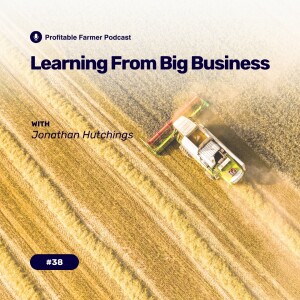
Monday Nov 18, 2019
# 38 - Learning from Big Business
Monday Nov 18, 2019
Monday Nov 18, 2019
In this podcast, we explore the way in which strategy, change, leadership transition, people management and business transformations are achieved at the top end of town, and within some of Australia’s largest, most iconic agribusiness brands.
In a compelling interview with Jonathan Hutchings, ex-management consultant and now private equity and business transformation specialist, Jeremy explores how fundamental change is made at the ‘top-end’ of our food & fibre sector, and in businesses including Peters Ice-cream, Ingham’s Chicken, and Allied Pinnacle.
Grab a coffee, tune in and learn:
How major change is achieved in big business,
The simplicity of strategy-setting and making the very complex simple,
How to be objective in analysing the true performance of your business,
The importance of getting the very best team around you,
The importance of retaining your humanity whilst navigating through big change initiatives,
A perspective on emerging trends in the food & fibre sector and how they may impact / provide opportunities for farming businesses.
If it’s good enough for the elite leaders in our sector, perhaps there is a lot we can learn and apply in our own family businesses.
Enjoy!
Kind Regards,
FOA
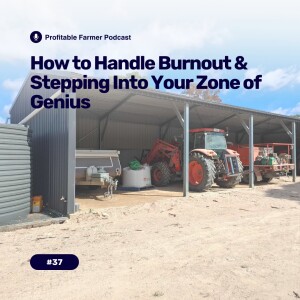
Thursday Oct 31, 2019
# 37 - How to handle burnout and stepping into your zone of genius
Thursday Oct 31, 2019
Thursday Oct 31, 2019
In this podcast, Andrew interviews Farm Owners Academy incoming CEO. Jeremy Hutchings is an amazing coach who is a lot of experience in agriculture.
Andrew and Jeremy have a discussion and cover a few really important topics that we are sure many of you can relate to
In this podcast:
Andrew shares some of the challenges he has experienced around burnout (and how normal this is when you run your own business)
The importance of having an extended time out
The difference between operating I your zone of incompetence v competence v excellence v genius
The value in building a dream team around you to help your business grow (and how investing in the right people will drive your business forward)
The importance of having a strong strategic plan
The definition of a business in becoming profitable but then also having your business work without you
How ego can get in the road of your growth
It’s a great relaxed discussion that we are sure you will relate to
FOA
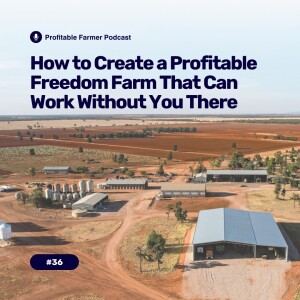
Wednesday Oct 02, 2019
# 36 - How to create a profitable freedom farm that can work without you there
Wednesday Oct 02, 2019
Wednesday Oct 02, 2019
One of our main aims here at Farm Owners Academy is to teach you how to create a profitable farming business that can work without your constant presence, allowing you more time and freedom to live the life you choose.
In today’s podcast, we walk you through the steps involved to accomplish this.
This episode shares lots of ideas to help you on your journey including:
Why you need to become very profitable first (and what this looks like)
The gap between being a farmer Vs running a farm business (and why this matters)
The three skills you must have to create a freedom farm
We hope you enjoy this podcast – let us know what you think!
FOA FACT: Sharing’s caring! 😉 Please share this with another farmer 👩🏻🌾👨🏼🌾
Regards
FOA







